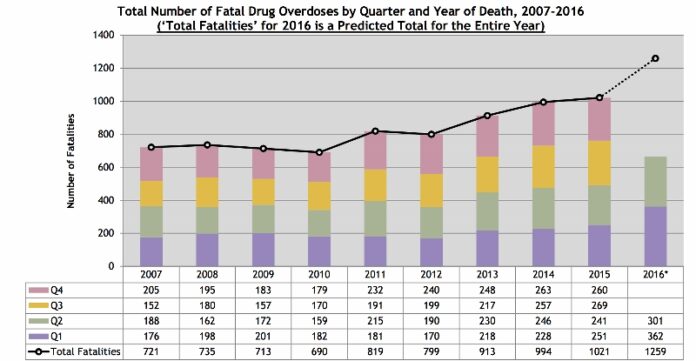
~ Health officials join together to address growing opioid addiction crisis in Virginia ~
State Health Commissioner Marissa J. Levine, MD, MPH, FAAFP, has declared the Virginia opioid addiction crisis to be a Public Health Emergency.
This declaration comes in response to the growing number of overdoses attributed to opioid use, and evidence that Carfentanil, a highly dangerous synthetic opioid used to sedate large animals such as elephants, has made its way into Virginia. A Public Health Emergency is an event, either natural or man made, that creates a health risk to the public.
“Too many families across Virginia and the nation are dealing with heartbreak and loss as a result of prescription opioid and heroin abuse epidemic,” said Governor McAuliffe. “We cannot stand by while these drugs harm our communities and our economy. That is why I support Dr. Levine’s decision to declare a Public Health Emergency, to heighten awareness of this issue, provide a framework for further actions to fight it, and to save Virginians’ lives.”
In response to the Public Health Emergency, and in partnership with Virginia’s Board of Pharmacy, Department of Health Professions and Department of Behavioral Health and Developmental Services, Dr. Levine has issued a standing order that allows all Virginians to obtain the drug Naloxone, which can be used to treat narcotic overdoses in emergency situations.
The standing order serves as a prescription written for the general public, rather than specifically for an individual, removing a barrier to access.
“As we see the nature of drug addiction shift, from prescription opioids to heroin and synthetic fentanyl, we must be vigilant and ready to respond quickly,” said Secretary of Health and Human Resources Dr. Bill Hazel. “The overdose rates in Virginia have led me to agree with Dr. Levine that we are indeed experiencing a public health emergency. This declaration helps us respond in a nimble way to a rapidly changing threat, while the Naloxone standing order from Dr. Levine broadens our ability to get life-saving medication into Virginians’ hands.”
By the end of 2016, the numbers of fatal opioid overdose deaths are expected to increase by 77 percent, compared to five years ago. In 2014, for the first time in Virginia, more people died from opioid overdoses than fatal car accidents.
Emergency department visits for heroin overdose for January-September 2016 increased 89 percent, compared to the same nine-month period in 2015. In the first half of 2016, the total number of fatal drug overdoses in Virginia increased 35 percent, when compared to the same time period in 2015, and in 2013, fatal drug overdoses became the number one cause of unnatural death.
“Pharmacists play an important role in combating opioid addiction,” said Virginia Board of Pharmacy Executive Director Caroline D. Juran, RPh. “By allowing Naloxone to be safely and responsibly issued by pharmacists to anyone in Virginia, friends and family members of individuals struggling with addiction can take a much-needed step towards preventing overdoses of loved ones.”
It can be difficult to know what to do when someone close to you is facing addiction, but there are simple things every Virginian can do to help those around them:
1) Know the signs of addiction and substance use: Signs of recent opioid use include pinpoint pupils, sleepiness, “nodding” and scratching. Common signs of addiction include constant money problems; arrests; track marks and infections from needle use; lying about drug use; irritability and, when drugs can’t be obtained, physical withdrawal symptoms such as shaking, dilated pupils, nausea, diarrhea and vomiting.
2) Talk to your loved ones: If you suspect that your friend or family member is struggling with addiction and substance use, talk with them. The state’s new website VaAware (http://vaaware.com/treatment-recovery/) offers resources on how to best discuss addiction with someone you love.
3) Properly dispose of medications: If you have unused, expired or unwanted medications and need a way to safely dispose of them, you can now get a drug disposal bag from your Local Health Department. The bags allow for you to safely deactivate and dispose of medications in the privacy of your own home. Additionally, you may return unwanted prescription drugs for destruction to one of the authorized pharmacies listed at www.dhp.virginia.gov/pharmacy/destructionsites.asp. Some local law enforcement agencies also collect and destroy unwanted drugs.
4) Obtain Naloxone: If someone in your life is struggling with opioid addiction, visit your local pharmacist to obtain Naloxone and keep it on hand for possible overdose emergencies. Naloxone is a medication that can reverse an overdose that is caused by an opioid drug (i.e. prescription pain medication or heroin). When administered during an overdose, naloxone blocks the effects of opioids on the brain and restores breathing within two to eight minutes.
Family members and friends can access this medication by obtaining a prescription from their family doctor or by visiting a participating pharmacy that can dispense the drug using the standing order issued by Dr. Levine. More information on Naloxone can be found at www.getnaloxonenow.org.
5) Learn more: DBHDS provides Opioid Overdose and Naloxone Education (OONE) to professionals, stakeholders and others through their REVIVE! program. Learn more about REVIVE! at www.dbhds.virginia.gov/individuals-and-families/substance-abuse/revive.
